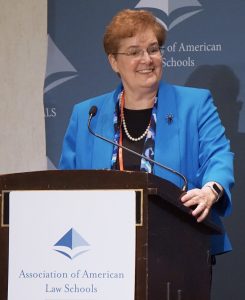Wendy Collins Perdue, AALS President and Dean, University of Richmond School of Law, interviewed by Emily Cherry Communications Director, University of Richmond School of Law

What prompted AALS to undertake the Before the JD study?
It was a couple of things. We are all well aware that between 2010 and 2015 applications to law school declined steeply. Interestingly, other graduate programs did not experience a similar decline. There were lots of theories about the reasons, but we did not have reliable data. In addition, one of the longest running surveys of college freshmen showed that between 1966 and 2014, there was a 25 percent decline in students identifying lawyer/judge as a likely career. Although Before the JD provides only a snapshot of what students are thinking today, it begins to fill in our understanding of what both motivates and worries today’s college students.
What was the biggest surprise for you in the data?
Two results were particularly striking. First, 55 percent of 1Ls reported that they first considered law school in high school were considering an advanced degree reported receiving information on campus about law school. This was a lower percentage than those who reported receiving information about PhDs, MBAs, and medical school, and dramatically lower than the 80 percent who reported receiving information about master’s degrees. Students who were already considering law said that they received information on campus, but apparently those who aren’t already thinking about law are not getting information about it.
Both of these results have implications for how and when we provide information to build the pipeline.
Did any demographic results surprise you?
Although the racial composition of the study population largely mirrors that of the undergraduate population, one demographic feature did stand out: 50 percent of students considering a JD reported that they have at least one parent with an advanced degree. This is pretty striking when you realize that of the adult population in the age range to have a child in college, only about 16 percent have an advanced degree.
At least part of the reason seems to be information. Fewer first-generation students across all degrees reported receiving information about graduate programs than students whose parent(s) had an advanced degree. But the difference was most pronounced for law: 40 percent of students with at least one parent with an advanced degree reported receiving information in college about the JD. Only 27 percent of first-generation college students reported the same.
What are the most promising takeaways from the report?
I was delighted to see that three of the top four reasons students give for considering a JD are the opportunities that law provides to advocate for social change, help others, and/or pursue a career in public service. These reasons stand in contrast to a broader survey done a few years ago (which was not limited to college students) that found only 18 percent of respondents thought lawyers contribute “a lot” to society’s wellbeing. At least those considering law as a career seem to be drawn to the profession because they see the potential social impact that lawyers can have.
How can law schools use this data?
These data show that there are many college students who are considering graduate school, but who aren’t getting any information about law school. Law schools send admissions professionals around the country to meet with prospective students, but we may want to explore new ways to reach out beyond those who came to college already thinking about law school. This includes STEM majors as well as first-generation students who don’t have lawyers among their close friends and family. If we want a legal profession that is truly inclusive and reflects a broad range of life experiences, we are going to have to do more to ensure that young people—even in high school or earlier—learn about law as a profession and the opportunities it offers.